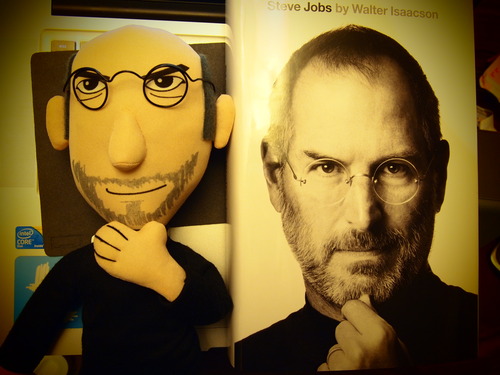
Steve Jobs wanted to change the world, "put a dent in the universe." And he did. If you are interested in life and want to know how Jobs changed it right before our eyes, you should read this book.
No other book on Jobs has been based on first hand information from the Master himself, his colleagues and his detractors. There is no other way to know the man who changed the way we live and work. The fact that the book is engaging is a big bonus.
First Jobs' personal life, personality and beliefs. Like all fascinating people in history, Jobs was a bundle of contradictions. Born out of wedlock, he was an American icon and yet born of a Syrian Muslim whom he never knew, but had accidentally met. Adopted at birth by working class parents, he became skeptical of the Church as the all-knowing god did not help the starving children in Biafra and alternated between being a believer and a non-believer. He was, at different times, a vegan and a fruitarian (hence the name Apple). Jobs was influenced by the counter cultural ideas of the 60's and the 70's and yet become one of the most revered corporate figures of all time. He was a multi-billionaire who lived on a regular street with no high fenced compound, security or live-in servants; a Zen Buddhist who was obsessed with Zen-like simplicity but did not possess Zen-like tranquility; a son who tried to abandon his child like the way he had thought he was abandoned; a leader who was highly demanding of his colleagues and coworkers; a vastly influential figure in computing who neither built computers not wrote codes himself; a genius who was mean to many people. All these factoids had to have some influence on who he was and who he became and may keep interested psychologists busy for years. Yet, it is not for these tabloid fodder that he is looked upon with awe. To get caught up in the contradictions of a man is to miss the man.
So who is the man then? Isaacson presents Jobs life and work as a play in three acts.
During the first act, two unlikely partners named Steves (Jobs and Woz) create the world's first commercially viable personal computer, Apple II. Jobs then creates the revolutionary but unsuccessful Lisa. Apple goes public, Jobs creates the Mac, which carves itself a distinct niche. He then brings in Pepsi's Scully to manage the company only to find himself ousted from the company he founded. During his exile Jobs creates another revolutionary but not-so-successful computer NeXT. But Jobs other venture, Pixar, an outstanding animation company, is a huge commercial success.
The second act is Jobs' return to Apple. Apple was in decline and it buys the money losing NeXT. Job returns to the company he founded as the interim CEO. Introduces a series of products: peppermint colored iMacs followed b y 21st Century Macs.
The third act is the post-pc revolution, the most dramatic of all: the creation of ipod (almost 10 years ago to the day), paradigm-changing iphone and the category-creating ipad, along with many other things and cloud computing. We can't imagine a world today without ipads, ipods and iphones. The rewards are high. Apple first surpasses Microsoft and becomes the most valuable tech company. Then Apple becomes, for brief periods of time, the most valuable company in the world.
But this is not the story of Apple, but of Job. What was happening in the background while the three act play is being staged - to his family, his health, his odd beliefs that might have cost him his life, and his relationships with other giants of technology - is the focus of this book. The story is told with many interesting anecdotes such as Bill Gates incredulously exclaiming "Do ALL of you live here?" when visiting for the first time Steve Jobs' modest house.
This is an "authorized biography" and I'm wary of "authorized" biographies. Always thought they were full-length PR pieces. This one is different. Jobs gave Isaacson complete freedom to write the book and Jobs didn't demand editorial control. He didn't even want to see the book before it was published. And it shows. You see Jobs as he was. Warts and all. This is Jobs' last gift to those of us who admired his vision of the world, but wondered about the essence of the man behind it all. Now we know.
As you finish reading Job's biography of nearly 600 pages, something strikes you as odd. Steve Jobs' death is not mentioned in the book. Not the date, not the time and not even the fact that he is no more. Strangely fascinating. Like the man himself.


